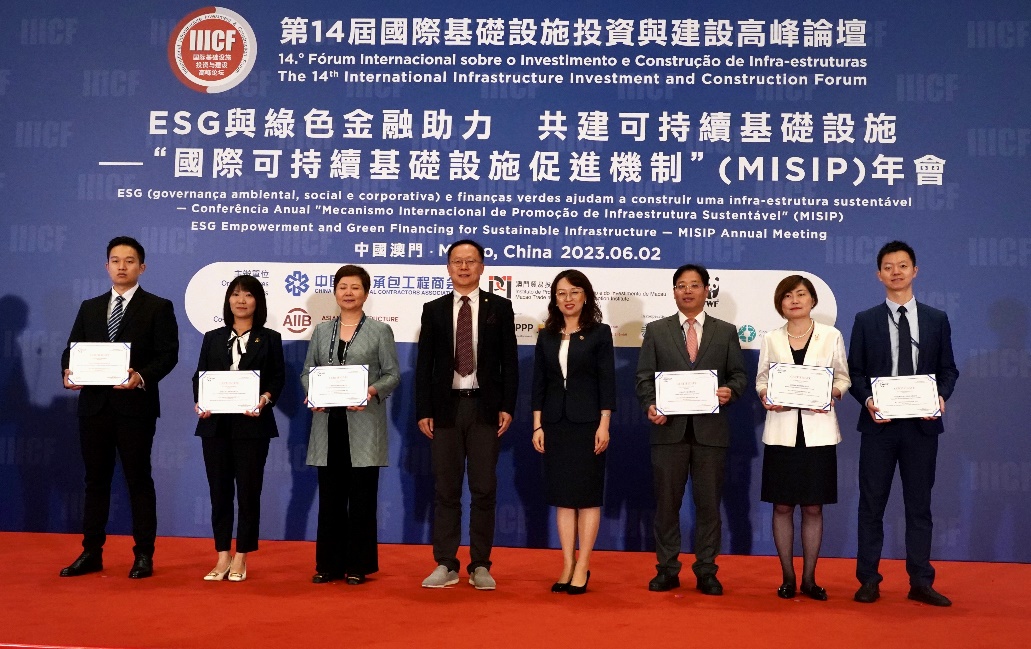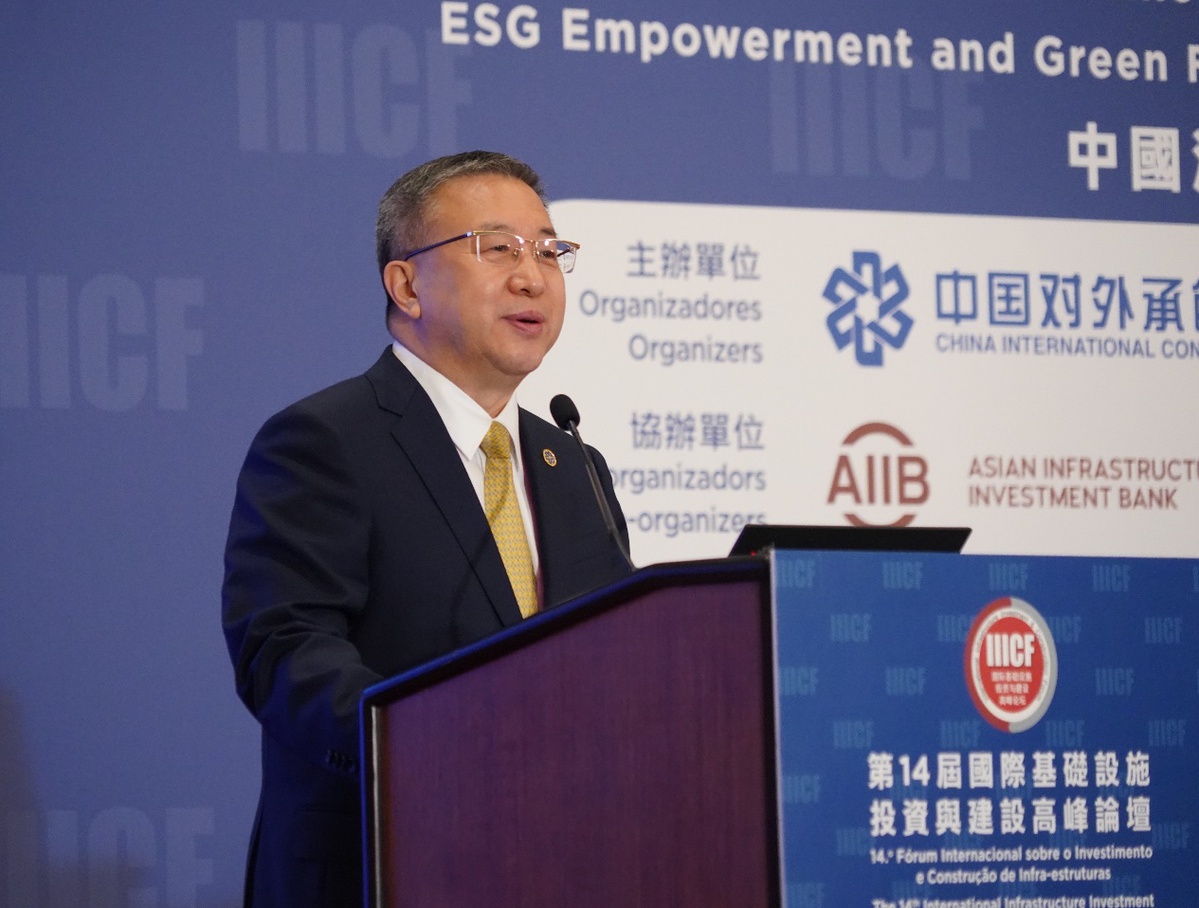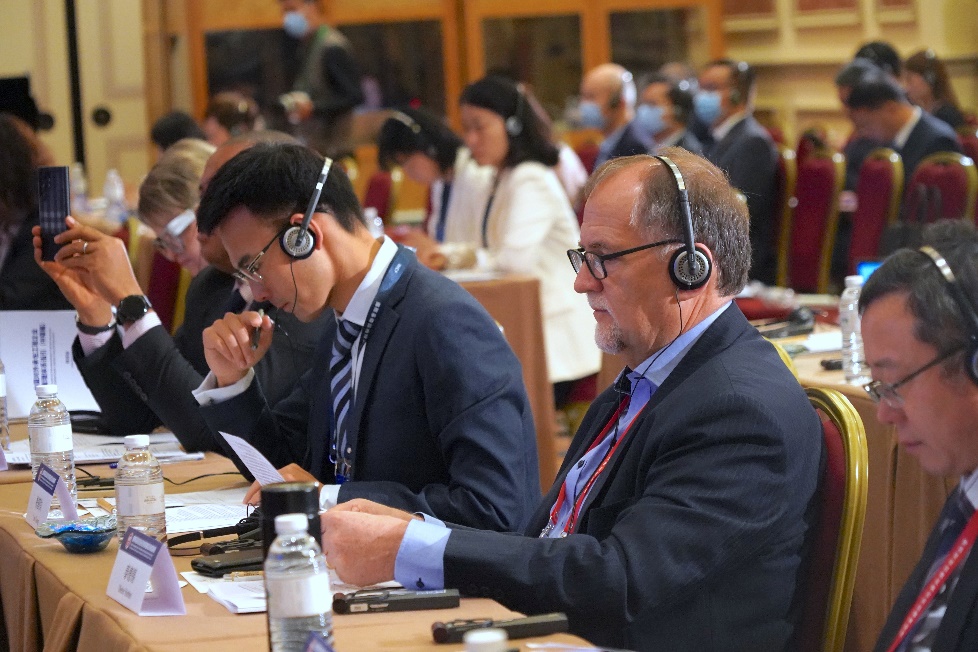
A special panel on ESG empowerment is held at the 14th International Infrastructure Investment and Construction Forum in Macao on June 2. [Photo by Li Xiang/chinadaily.com.cn]
Standards can help provide direction for sector's low-carbon transition, experts tell industry panel in Macao
As sustainability becomes a hot topic in the field of international infrastructure, ESG standards can provide important direction and momentum for the sector's green and low-carbon transition, analysts told a global industry panel.
The "ESG Empowerment and Green Financing for Sustainable Infrastructure – MISIP Annual Meeting" panel was held at the 14th International Infrastructure Investment and Construction Forum, or IIICF, in Macao Special Administrative Region on June 2.
At the event, experts from various sectors discussed ESG – which stands for environmental, social, and corporate governance – and the Mechanism for International Sustainable Infrastructure Promotion, or MISIP.
The mechanism was jointly initiated by the Asian Infrastructure Investment Bank (AIIB), China International Contractors Association, Deutsche Gesellschaft fur Internationale Zusammenarbeit (GIZ), the United Nations Environment Programme and the World Wide Fund for Nature (WWF) at last year's IIICF.
This year's panel topics included green finance-related issues, a guide to taking climate resilience and biodiversity into financial decision-making, and exploring pathways in developing high-quality, sustainable infrastructure.
Guinea's Vice-Minister of Infrastructure and Public Works Ibrahima Camara said that his country is rich with natural resources and there is huge potential for infrastructure development.
China is an important partner of Guinea, he said, and the two countries can continue to strengthen cooperation in many areas. "The long-term challenges will be to promote the use of low-carbon, renewable energy and low-emission technologies to process our mining and agricultural products, build infrastructure and enhance environmental protection," Camara explained.

Chairman of the China International Contractors Association Fang Qiuchen speaks at the ESG panel in Macao on June 2. [Photo by Li Xiang/chinadaily.com.cn]
Chairman of the China International Contractors Association Fang Qiuchen said that to implement ESG concepts, it is important to make good use of tools such as green finance and to coordinate the interests and concerns of all parties, as well as jointly promoting the implementation of more sustainable infrastructure projects.
This requires the participation of all relevant parties such as governments, investors, financial institutions and contractors, he added.
Regional Director of East Asia at GIZ, or the German Society for International Cooperation, Thorsten Giehler said the importance of ESG standards, coupled with the power of green finance, presents a unique opportunity to create a sustainable and resilient future.
"Through MISIP, we envision a world where sustainable infrastructure thrives, driven by innovation, collaboration, and a shared commitment to ESG principles," he said. Giehler also called on the world to seize the moment to exchange ideas, foster partnerships, and catalyze transformative action, paving the way for a brighter, greener, and more inclusive future.
ESG has become a key driver in shaping the future of business, investments, and economies worldwide, said Vice-president of Policy and Strategy at the AIIB Danny Alexander.
"The concept emphasizes the need to consider not only financial returns but also the impact of our actions on the planet and society as a whole," he said. "They are essential for ensuring that infrastructure is done well and that the necessary financing can flow."
Intended as an open and collaborative platform, MISIP was created to provide opportunities for cooperation on knowledge sharing, project financing, capacity building, and other critical workstreams. It also aims to unify key stakeholders to promote and accelerate sustainable infrastructure development that contributes to a smooth, inclusive and sustainable global recovery for all.
"It is truly exciting to see the MISIP initiative gain recognition for its role in promoting sustainable infrastructure standards and increasing in its number of members," said Alexander.
As a climate-driven, 21st-century multilateral development bank, AIIB has pledged to align all our new financing operations with the goals of the Paris Agreement by July 1, he added.
"Our Corporate Strategy highlights a target of achieving at least a 50 percent share of climate finance in our actual financing approvals by 2025 – a target we surpassed in 2022, with 56 percent of our approvals being climate-related," Alexander said.
Managing Director of Asia Pacific at the CFA Institute Nick Pollard said ESG investing is seen as both a way to lower the long-term risk profile of investments and to also earn higher returns over time. Global ESG assets are expected to hit $53 trillion by 2025, accounting for more than one-third of the $140.5 trillion in total assets under management, he said.
In the Asia Pacific region, more markets are incorporating biodiversity into their plans and frameworks, he added. Some markets even require businesses and investment firms to declare any activities that could negatively impact biodiversity-sensitive areas, Pollard explained.
"Therefore, investors need to assess biodiversity risks and opportunities in economic, investor, and social terms," he said.
Pollard also noted that accelerating the sustainable investing landscape requires a collective and concerted effort through skills, disclosure, and data.

The IIICF forum draws attendees from about 60 countries and regions to Macao on June 1-2. [Photo by Li Xiang/chinadaily.com.cn]
Among all the environmental challenges, biodiversity conservation is put on the high agenda. In December 2022, the Kunming-Montreal Global Biodiversity Framework reached at the 15th meeting of the Parties to the Convention on Biological Diversity proposed that all parties should take urgent actions to stop and reverse the loss of biodiversity before 2030.
Chief Programme Officer of WWF China Zhou Fei said that biodiversity is the blessing of humankind, and the foundation for the well-being of the Earth and economic prosperity. He finds it important to join hands to align the investment in infrastructure area with the goals of Kunming-Montreal Global Biodiversity Framework and Paris Agreement.
After the panel, Director General of the Department of Strategy and Consulting of China International Contractors Association Shang Shengping released their latest report and announced new partners.
Technology is a key factor for environmental progress and China remains a major partner in financing investments on the continent of Africa, especially in road construction -- its contribution to Africa's development has been tremendous, said Amadou Mansour Faye, Senegal's Minister of Infrastructure, Land Transport and Opening-up.
At an earlier panel discussion of IIICF in Macao, he also noted that to reduce energy consumption, solar farms are being installed in his country over thousands of hectares of highways to produce clean energy that can be used for road lighting and toll booth operation.
Sri Lankan Minister of Ports, Shipping and Aviation Nimal Siripala De Silva said it is also important for the nation battered by the pandemic to take the road of digitalization, which is the focus of Sri Lanka economic development.
For instance, now the Port of Colombo attaches great importance to the power of digitalization and innovation, so all their terminals are now transformed and have undergone digital transformation, he said.
Sri Lanka is coming out of economic difficulties and in the process of recovery from the pandemic, but it is still not easy to return the economy to normal, the minister said.
Li Xiang in Macao contributed to this report.